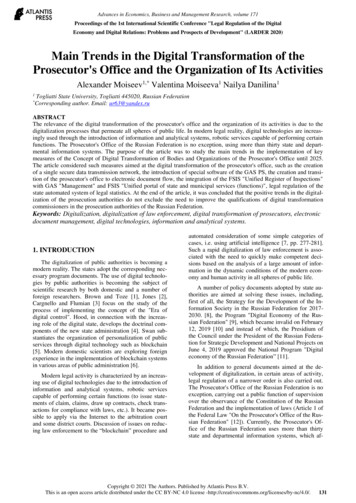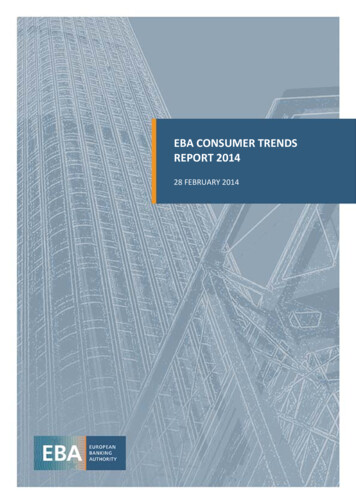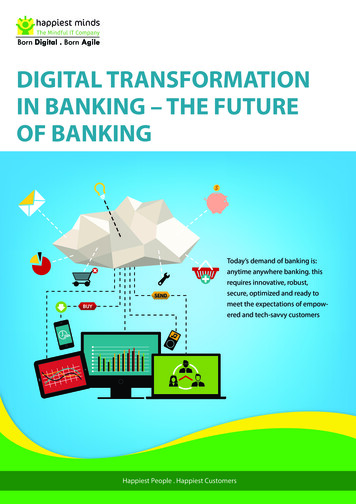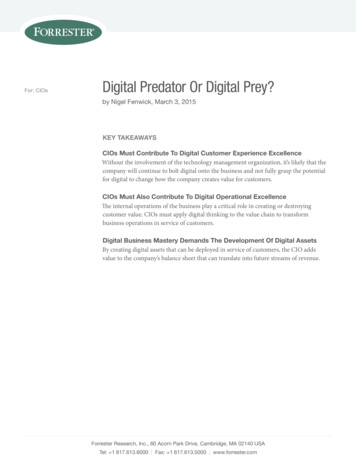
Transcription
Advances in Economics, Business and Management Research, volume 171Proceedings of the 1st International Scientific Conference "Legal Regulation of the DigitalEconomy and Digital Relations: Problems and Prospects of Development" (LARDER 2020)Main Trends in the Digital Transformation of theProsecutor's Office and the Organization of Its ActivitiesAlexander Moiseev1,* Valentina Moiseeva1 Nailya Danilina11Togliatti State University, Togliatti 445020, Russian FederationCorresponding author. Email: ur63@yandex.ru*ABSTRACTThe relevance of the digital transformation of the prosecutor's office and the organization of its activities is due to thedigitalization processes that permeate all spheres of public life. In modern legal reality, digital technologies are increasingly used through the introduction of information and analytical systems, robotic services capable of performing certainfunctions. The Prosecutor's Office of the Russian Federation is no exception, using more than thirty state and departmental information systems. The purpose of the article was to study the main trends in the implementation of keymeasures of the Concept of Digital Transformation of Bodies and Organizations of the Prosecutor's Office until 2025.The article considered such measures aimed at the digital transformation of the prosecutor's office, such as the creationof a single secure data transmission network, the introduction of special software of the GAS PS, the creation and transition of the prosecutor's office to electronic document flow, the integration of the FSIS "Unified Register of Inspections"with GAS "Management" and FSIS "Unified portal of state and municipal services (functions)", legal regulation of thestate automated system of legal statistics. At the end of the article, it was concluded that the positive trends in the digitalization of the prosecution authorities do not exclude the need to improve the qualifications of digital transformationcommissioners in the prosecution authorities of the Russian Federation.Keywords: Digitalization, digitalization of law enforcement, digital transformation of prosecutors, electronicdocument management, digital technologies, information and analytical systems.1. INTRODUCTIONThe digitalization of public authorities is becoming amodern reality. The states adopt the corresponding necessary program documents. The use of digital technologies by public authorities is becoming the subject ofscientific research by both domestic and a number offoreign researchers. Brown and Toze [1], Jones [2],Cargnello and Flumian [3] focus on the study of theprocess of implementing the concept of the "Era ofdigital control". Hood, in connection with the increasing role of the digital state, develops the doctrinal components of the new state administration [4]. Swan substantiates the organization of personalization of publicservices through digital technology such as blockchain[5]. Modern domestic scientists are exploring foreignexperience in the implementation of blockchain systemsin various areas of public administration [6].Modern legal activity is characterized by an increasing use of digital technologies due to the introduction ofinformation and analytical systems, robotic servicescapable of performing certain functions (to issue statements of claim, claims, draw up contracts, check transactions for compliance with laws, etc.). It became possible to apply via the Internet to the arbitration courtand some district courts. Discussion of issues on reducing law enforcement to the “blockchain” procedure andautomated consideration of some simple categories ofcases, i.e. using artificial intelligence [7, pp. 277-281].Such a rapid digitalization of law enforcement is associated with the need to quickly make competent decisions based on the analysis of a large amount of information in the dynamic conditions of the modern economy and human activity in all spheres of public life.A number of policy documents adopted by state authorities are aimed at solving these issues, including,first of all, the Strategy for the Development of the Information Society in the Russian Federation for 20172030. [8], the Program "Digital Economy of the Russian Federation" [9], which became invalid on February12, 2019 [10] and instead of which, the Presidium ofthe Council under the President of the Russian Federation for Strategic Development and National Projects onJune 4, 2019 approved the National Program "Digitaleconomy of the Russian Federation” [11].In addition to general documents aimed at the development of digitalization, in certain areas of activity,legal regulation of a narrower order is also carried out.The Prosecutor's Office of the Russian Federation is noexception, carrying out a public function of supervisionover the observance of the Constitution of the RussianFederation and the implementation of laws (Article 1 ofthe Federal Law "On the Prosecutor's Office of the Russian Federation" [12]). Currently, the Prosecutor's Office of the Russian Federation uses more than thirtystate and departmental information systems, which af-Copyright 2021 The Authors. Published by Atlantis Press B.V.This is an open access article distributed under the CC BY-NC 4.0 license 1
Advances in Economics, Business and Management Research, volume 171fects the quality and efficiency of its supervisory activities in the context of the variety and efficiency of tasksand the increasingly complex prosecutorial activities ingeneral.fice, whose activities are aimed at implementing theactivities stipulated by the Concept.3. MAIN STEPS AND MEASURES2. DIGITAL LEGAL TRANSFORMATIONThe Concept of Digital Transformation of Bodiesand Organizations of the Prosecutor's Office of the Russian Federation until 2025 [13] (hereinafter - the Concept) is aimed at improving information support, comprehensive optimization of the internal activities of theprosecutor's office, the formation and development of adigital environment, a digital ecosystem of prosecutionauthorities.The Concept sets goals for the digital transformationof the prosecutor's office, including not only increasingthe efficiency of the prosecutor's office to ensure therule of law, unity and strengthening the rule of law, butalso increasing the information security of the prosecutor's office, developing its own digital infrastructure.The Concept outlines the principles in accordance withwhich the digital transformation of the prosecution authorities takes place: optimization, consolidation, reliability, standardization, a single data model, unification,virtualization, modularity, import substitution, information security.The Concept identifies the creation of high-tech supervision, digital infrastructure and an environment oftrust as the main directions of digital transformation ofthe prosecutor's office.The purpose of this article is to investigate the maintrends in the implementation of key activities within themain areas of digital transformation of prosecutors.In order to implement the Concept of digital transformation of the prosecutor's office, on February 8,2018, a joint order of the General Prosecutor's Office ofthe Russian Federation and the Ministry of Communications and Mass Media of the Russian Federation No.68/56 (hereinafter - Order No. 68/56) was adopted [14].This document is aimed at improving information support and increasing the efficiency of the activities of theprosecutor's office of the Russian Federation.Achievement of the goal of digital transformation ofthe prosecution authorities is expected through the openpublication of statistical data on the state of crime on apublic portal on the Internet, reducing the time for receiving requests to the performer to 1 day, consideringall requests in electronic form, providing prosecutorswith a maximum of available information systems.In order to implement Order No. 68/56, collegialproject management bodies were formed in the prosecutor's office - the Project Committee and the Project Of-Over the entire period of the Concept, a number ofmeasures have been implemented for the digital transformation of the bodies and organizations of the prosecutor's office, among which the following can be distinguished.Firstly, the lack of communication channels to theprosecutor's offices of the district and city level wascompensated for by creating a unified secure datatransmission network (hereinafter - EZSPD), which isin trial operation.The EZSPD implements two independent segmentswith a different class of information protection. In departmental information systems, a closed loop of theEZSPD is implemented. In addition, as a common datatransmission infrastructure, EZPSD provides centralized secure access to the Russian state segment of theInternet information and telecommunications network.In 2018, structured cable networks were built in 292prosecutors' offices, the construction of which isplanned to be completed in 2020 [15].More than 3 thousand automated workstations withsoftware are connected to the EZSPD, through whichvideo conferences are held. It is planned to completelyreplace the park of automated workplaces by the end of2021 [15].Secondly, one of the directions of the transition ofprosecutors to a digital work environment is the introduction of special software for the state automated system of legal statistics (hereinafter - GAS PS), whichshould contribute to a radical change in the collectionand processing of legal statistics.As for the GAS PS portal itself, at present it has improved and unified user interfaces, as well as developednew functionalities.Thus, the component "typical violations" has beenimproved, which allows to ensure control over the reliability and timeliness of the provision of statistical information. This component automatically generates listsof criminal cases, primary accounting documents.The "Free search" mode allows one to find information in a combination of any requisites of variousforms of statistical cards. In addition, the ability tosearch for the necessary information by phrases or several words has been expanded, which is widely used inthe preparation of analytical documents.In personal accounts, it became possible to registercriminal cases with the assignment of a unique number132
Advances in Economics, Business and Management Research, volume 171to them according to the uniform numbering rules inforce on the territory of the Russian Federation.Based on the information entered into the web interface of the user's personal account on the GAS Software portal, it became possible to generate primaryaccounting documents. This interface allows you toenter data directly on procedural actions and by fillingin the fields that reflect the statistical information to berecorded. All this makes it possible for the user to focuson entering new information on a criminal case, ratherthan determining which statistical cards and in whatvolume he should fill out. All this reduces the labor andtime costs of both prosecutors and other law enforcement agencies.In addition, on the basis of the GAS PS, it isplanned to create and implement a legally significantelectronic document circulation and ensure its integration with the interdepartmental electronic documentcirculation system of a single interdepartmental digitalonline platform for interaction between prosecutors andheads of state bodies at all levels.The General Prosecutor's Office of the Russian Federation has developed an action plan for the implementation of the GAS PS in all prosecutor's offices of theconstituent entities of the Russian Federation in 20192021.Third, the prosecutor's office is moving to electronicdocument management, for which the AIC “Supervision-WEB” subsystem has been created, which increases the throughput of processing requests and complaints, and thereby reduces the waiting time for feedback.Trial operation of the AIC "Supervision-WEB" subsystem is carried out in a number of prosecutors' officesin Novgorod, Pskov, Rostov, Chelyabinsk regions, theVolga transport prosecutor's office and in subdivisionsof the General Prosecutor's Office of the Russian Federation [15]. The start of operation of "SupervisionWEB" in the central office of the prosecutor's officebegan on August 5, 2019.With the introduction of the AIC "SupervisionWEB" subsystem in the central office of the GeneralProsecutor's Office, paper statistical cards for appealswere abolished. The report on work with appeals andcomplaints of citizens is kept in electronic form usingthis subsystem [16].In general, this is the first step for the transition toelectronic document management and the connection ofthe prosecutor's office to the FSIS "Single portal ofstate and municipal services (functions)".Fourthly, the program "Reform of control and supervisory activities" is implemented through the inte-gration of FSIS "Unified Register of Inspections" withGAS "Management" and FSIS "Unified Portal of Stateand Municipal Services (Functions)". The functionalityof the federal state information system "Unified Register of Inspections" (hereinafter - FSIS ERP) is beingexpanded.Trial operation of the software that implements thefunctions of filing an appeal and making an appointment with the prosecutor's office using the Unified Portal of State and Municipal Services in the prosecutor'soffices of the city of Moscow, Novgorod and Pskovregions is being carried out.It is assumed that by 2025, the time it takes for applications to reach the contractor should be reduced to1-2 days, and the share of their consideration shouldreach 100%.In order to ensure a prompt response to the facts ofviolations of the rights of business entities, by order ofthe Prosecutor General of the Russian Federation ofSeptember 19, 2019 No. 665, the Regulation was approved, which determines the procedure for consideringcomplaints from business entities received through aspecially created digital platform in connection with thepressure exerted on them by law enforcement organs[17].The implementation of these measures will createconditions for convenient and transparent interaction ofthe prosecutor's office with citizens and entrepreneurs,and as a result - the effective implementation of theirtasks by prosecutors.Fifth, the digital transformation of the prosecutor'soffice is carried out on the basis of legal regulation implemented in the state automated system of legal statistics and the federal state information system "UnifiedRegister of Inspections".Trial operation of the GAS PS is carried out in 27prosecutor's offices of the constituent entities of theRussian Federation and in the Main Military Prosecutor's Office. During the period of trial operation, theSAS PS processed 9.2 million statistical cards, registered 1.3 million criminal cases on the fact of 1.4 million crimes, 697.3 thousand victims of criminal encroachments and 604.2 thousand suspects, accused inthe commission of crimes. The unified data warehousecontains information on 11.3 million registered reportsof crimes [18].To ensure the timeliness of accounting for statisticalinformation and reduce the time for its provision duringthe trial operation of the GAS PS, a transition was madeto the use of electronic technology with the use of electronic signature means, as a result of which the proportion of electronic primary accounting documents received by the GAS PS was 93%.133
Advances in Economics, Business and Management Research, volume 171The functionality of the state automated system oflegal statistics is widely used in the prosecutor's officewhen preparing analytical documents.The General Prosecutor's Office of the Russian Federation has prepared a draft standard regulation on themanagement (department) of legal statistics, information technology and information protection of theprosecutor's office of the constituent entity of the Russian Federation and the specialized prosecutor's officeequated to it [19]. This project outlines the managementstructure, its main tasks and functions, as well as thecompetence and powers of management employees.In addition to the designated activities aimed at implementing the Concept, measures are being taken tocreate appropriate means of identification and authorization, without which it is impossible to use moderninformation technologies.In 2018, the certification center of the General Prosecutor's Office of the Russian Federation generatedmore than 5086 qualified certificates of keys for verifying electronic signatures. Much attention is paid to theprotection of departmental information resources. Forthis purpose, a state system for detecting, preventingand eliminating computer attacks (GosSOPKA) hasbeen created.Work continues on the main digital transformationservices for prosecutorial bodies and organizations.For example, at a working meeting held in July2019 at the Prosecutor General's Office of the RussianFederation with representatives of the Voskhod Research Institute for digital transformation, representatives of the Voskhod Research Institute detailed theProsecutor's Personal Account module, in which it isplanned to provide access to automated informationsystems to an employee of the prosecutor's office. Thespecified personal account will include the followingsections: "Prosecutor's calendar", "Prosecutor's inspections", "Administrative offenses case management","Intelligent processing of appeals", "Anti-corruptionexpertise of legal acts", "Service of analysis and reporting on appeals", "Formation of acts of prosecutor's response" and others [20].4. CONCLUSIONSIn general, despite the positive trends in the digitalization of prosecution bodies, it should be noted that it isnecessary to improve the qualifications of commissioners for digital transformation in the divisions of theProsecutor General's Office of the Russian Federation.In addition, similar modifications need to be done tothe prosecutor's offices of the constituent entities of theRussian Federation and specialized prosecutor's officesequated to them, as well as their maximum involvementin the work of the project office for specialized events.All these steps and provisions would significantly improve the pathway of the informatization of the digitaltransformation of the prosecutor's office and the organization of its activities in the Russian Federation.REFERENCES[1] D. Brown, S. Toze, Information governance in digitized public administration, Canadian public .org/10.1111/capa.12227[2] P. Jones, The futures of Canadian governance: Foresight competencies for public administration in the digital era, Canadian public administration 60(4) (2017)657–681. DOI: https://doi.org/10.1111/capa.12241[3] D. Cargnello, M. Flumian, Canadian governance intransition: Multilevel governance in the digital era, Canadian public administration 60(4) (2017) 605–626.DOI: https://doi.org/10.1111/capa.12230[4] C. Hood, A Public Management for all 10.1111/j.1467-9299.1991.tb00779.x[5] M. Swan, Blockchain. Blueprint for a New Economy, O’Reilly, 2015, 152 p.[6] Y. Vertakova, E. Leontyev, V. Mkrtchyan, Information provision of decision support systems in conditions of structural changes and digitalization of theeconomy, Journal of Applied Engineering 7/jaes16-18131[7] D.S. Zuev, A.A. Marchenko, A.F. Khasiannov, TextMining Tools in Legal Documents, in: L.A. Kalinichenko, Y. Manolopoulos, N.A. Skvortsov, V.A. Sukhomlin (Eds.), Data Analytics and Management inData Intensive Domains, Collection of Scientific Papersof the 19th International Conference (DAMDID/RCDL’), MSU, Moscow, 2017, pp. 277-281.[8] Decree of the President of the Russian Federationdated 09.05.2017 No. 203 "On the Strategy for the Development of the Information Society in the RussianFederation for 2017 - 2030" // SZ RF. 2017. No. 20.Art. 2901.[9] Order of the Government of the Russian Federationof July 28, 2017 No. 1632-r "On approval of the program" Digital economy of the Russian Federation "//SZ RF. 2017. No. 32. Art. 5138 (no longer valid).134
Advances in Economics, Business and Management Research, volume 171[10] Order of the Government of the Russian Federation of 12.02.2019, No. 195-r "On recognizing as invalid the order of the Government of the Russian Federation of 28.07.2017, No. 1632-r" // SZ RF. 2019. No. 8.Art. 803.[11] Passport of the national project "National Program" Digital Economy of the Russian Federation "(approved by the Presidium of the Council under the President of the Russian Federation for Strategic Development and National Projects, Minutes dated 04.06.2019,No. 7) http://www.consultant.ru/ Accessed on 11 Aug2019[12] Federal Law of 17.01.1992, No. 2202-1 (asamended on 26.07.2019) "On the Prosecutor's Office ofthe Russian Federation" // Collected Legislation of theRussian Federation. 1995. No. 47. Art. 4472.[13] The Prosecutor General’s Office of the RussianFederation (2017) Order of the Prosecutor General'sOffice of Russia dated September 14, 2017 No. 627"On Approval of the Concept of Digital Transformationof Bodies and Organizations of the Prosecutor's Officeuntil 2025" (together with the "Concept of DigitalTransformation of Bodies and Organizations of theProsecutor's Office of the Russian Federation until2025") // Legality. 2017. No. 12.[14] The Prosecutor General’s Office of the RussianFederation (2018) Order of the Prosecutor General'sOffice of the Russian Federation and the Ministry ofTelecom and Mass Communications of the RussianFederation of 08.02.2018 No. 68/56 "On approval ofthe passport of the project for digital transformation ofbodies and organizations of the Prosecutor's Office ocuments/orders/document-1331642/ Accessed on 22 Oct 2019Office of Russia dated September 19, 2019 No. 665"On the approval of the Regulations for considerationof appeals from business entities received through aspecially created digital platform in connection with thepressure exerted on them by law enforcement agencies". http://www.consultant.ru/ Accessed on 8 Feb2020[18] The Prosecutor General’s Office of the RussianFederation (2018) The Prosecutor General's Office ofthe Russian Federation summed up the results of thepilot launch in 27 regions of the state automated smi/news/genproc/news1355722/ Accessed on 22 Oct 2019[19] The Prosecutor General’s Office of the RussianFederation (2019) Draft Order of the Prosecutor General's Office of Russia "On Approval of the ModelRegulations on the Management (Department) of LegalStatistics, Information Technologies and InformationProtection of the Prosecutor's Office of the ConstituentEntity of the Russian Federation and Equivalent Specialized Prosecutor's Office" (as of 05.07.2019).http://www.consultant.ru/ Accessed 8 Oct 2019[20] The Prosecutor General’s Office of the RussianFederation (2019) At the General Prosecutor's Officeof the Russian Federation, a working meeting was heldwith the representatives for digital transformation of thebodies and organizations of the prosecutor's office ofthe Russian Federation: The General Prosecutor's Office of the Russian Federation. 29 july 664298Accessed on 20 Oct 2019[15] The Prosecutor General’s Office of the RussianFederation (2019) Measures for the implementation ofmeasures for the digital transformation of the bodiesand organizations of the prosecutor's office of the enproc/news-1595842Accessed on 20 Oct 2019[16] The Prosecutor General’s Office of the RussianFederation (2017) Order of the Prosecutor General'sOffice of Russia dated May 16, 2017 No. 346 "On theapproval and implementation of the statistical report"On the work of the prosecutor in considering applications, complaints and other appeals "in the form of nsultant.ru/ Accessed on 15 Nov 2018[17] The Prosecutor General’s Office of the RussianFederation (2019) Order of the Prosecutor General's135
The General Prosecutor's Office of the Russian Fed-eration has developed an action plan for the implemen-tation of the GAS PS in all prosecutor's offices of the constituent entities of the Russian Federation in 2019-2021. Third, the prosecutor's office is moving to electronic document management, for which the AIC "Supervi-











